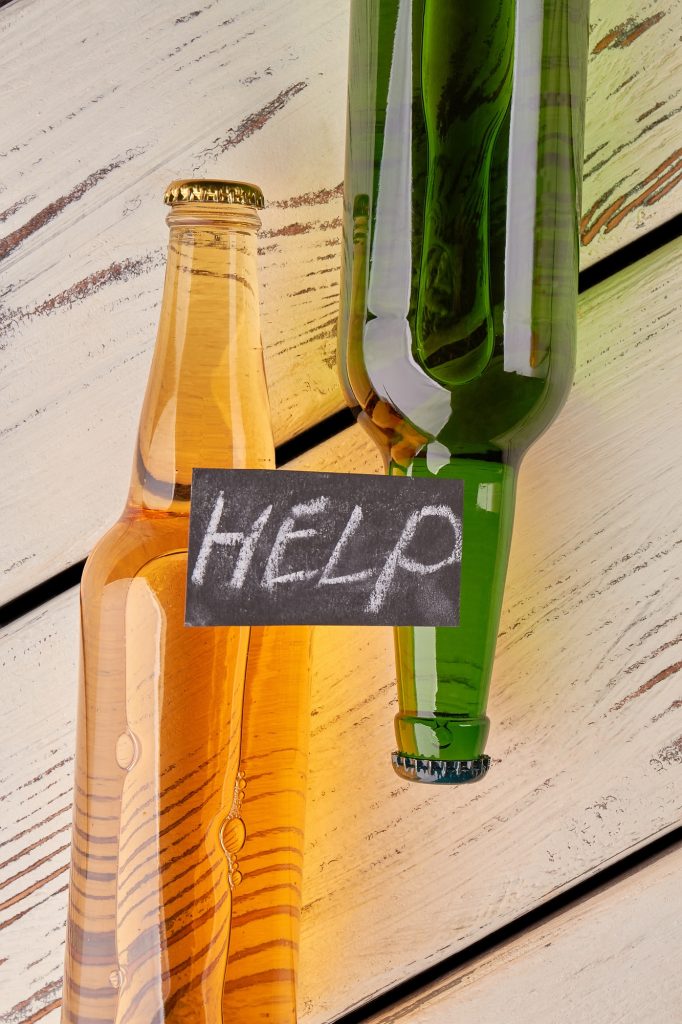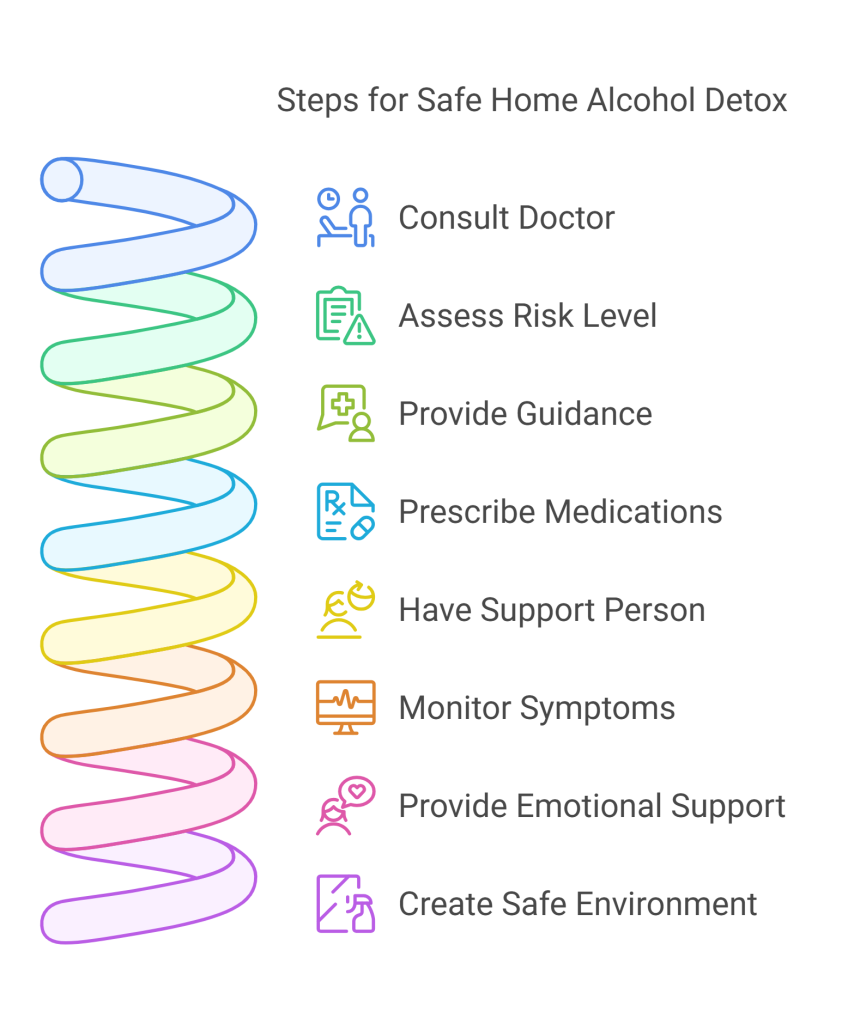How Safe is Home Detox? Understanding the Risks and Precautions.
Introduction
Detoxing from alcohol is the first and most crucial step toward sobriety. For some, home detox offers a private, flexible, and cost-effective way to quit drinking. However, is it safe?
The safety of home detox depends on several factors, including the severity of alcohol dependence, overall health, and the presence of a strong support system. While some individuals can detox at home safely, others may face serious withdrawal risks that require medical supervision.
In this guide, we will explore the safety of home detox, potential risks and complications, and precautions to take to ensure a safer detox process.

Is Home Detox Safe for Everyone?
✅ Home Detox May Be Safe for You If:
- You have mild to moderate alcohol dependence.
- You do not have a history of severe withdrawal symptoms (seizures, hallucinations, delirium tremens).
- You are in good overall health with no serious medical conditions.
- You have a strong support system (friends or family to monitor you).
- You have mentally prepared for withdrawal symptoms and how to manage them.
For individuals who meet these criteria, home detox can be a safe and manageable process, provided they take the necessary precautions.
⚠ Home Detox is NOT Safe If:
- You have a history of severe withdrawal symptoms (such as seizures or hallucinations).
- You drink heavily on a daily basis or have been dependent for years.
- You have underlying medical conditions (liver disease, heart disease, diabetes, or neurological issues).
- You have a history of delirium tremens (DTs)—a severe and life-threatening withdrawal condition.
- You do not have support (no one to check on you or help during detox).
- You have a history of relapse or suicidal thoughts.
If you fall into this high-risk category, home detox can be dangerous and potentially life-threatening. It’s highly recommended to seek medical detox under professional supervision.

Risks of Home Detox
1. Alcohol Withdrawal Symptoms Can Be Unpredictable
Alcohol withdrawal symptoms can vary greatly from person to person. While some may experience mild symptoms, others can face severe, life-threatening complications.
Common Withdrawal Symptoms (Mild to Moderate):
✅ Anxiety, restlessness, and irritability
✅ Sweating and tremors (shaking hands)
✅ Nausea, vomiting, and loss of appetite
✅ Insomnia or disturbed sleep
✅ Headaches and body aches
Severe Withdrawal Symptoms (Medical Emergency):
⚠ Delirium Tremens (DTs) – hallucinations, confusion, and severe agitation
⚠ Seizures – can lead to loss of consciousness or injury
⚠ High fever and dehydration – leading to extreme weakness or collapse
⚠ Irregular heartbeat (arrhythmia) – increases the risk of heart attack or stroke
⚠ Severe vomiting and diarrhea – can cause dangerous dehydration
Without medical supervision, severe withdrawal symptoms can quickly become life-threatening.

2. Lack of Medical Support in an Emergency
One of the biggest concerns with home detox is that there is no immediate medical assistance if complications arise. If symptoms worsen, seeking help too late can be dangerous.
A medical detox facility can provide:
✅ 24/7 monitoring by healthcare professionals
✅ Medications to ease withdrawal symptoms
✅ IV fluids and electrolyte support to prevent dehydration
✅ Emergency care for seizures or heart problems
At home, you may not have access to life-saving interventions, which is why severe alcohol dependence should always be treated under medical supervision.
3. High Risk of Relapse
Detoxing at home can be mentally and physically exhausting. Without medical support, cravings can become overwhelming, leading to a high risk of relapse.
Common triggers for relapse during home detox include:
🔹 Unmanaged withdrawal symptoms (causing discomfort and temptation to drink again)
🔹 Emotional distress (depression, anxiety, or loneliness)
🔹 Easy access to alcohol (if alcohol is still in the home)
🔹 Lack of structured support (no counseling or professional guidance)
Relapsing after a period of abstinence can be extremely dangerous, as tolerance levels drop quickly. This puts individuals at a higher risk of alcohol poisoning if they drink again.


How to Make Home Detox Safer
If you decide to detox from alcohol at home, taking proper precautions is critical to reducing risks.
✅ 1. Consult a Doctor Before Detoxing
Even if you choose to detox at home, it’s best to speak with a healthcare professional first. They can:
- Assess your risk level based on drinking history and health conditions.
- Provide guidance on managing withdrawal symptoms.
- Prescribe medications to ease symptoms and reduce complications.
✅ 2. Have a Trusted Support Person Available
Never attempt home detox alone. Ask a family member, friend, or sober companion to stay with you or check in regularly. They can:
- Monitor symptoms and call for help if needed.
- Provide emotional support and encouragement.
- Help with food, hydration, and medications during withdrawal.
✅ 3. Create a Safe Detox Environment
- Remove all alcohol from your home to reduce the temptation to drink.
- Have plenty of hydrating fluids, such as water, herbal tea, and electrolyte drinks.
- Eat nutritious meals to help your body recover.
- Have comfortable bedding and rest areas, as fatigue is common.
✅ 4. Monitor for Severe Symptoms
If you experience any of the following symptoms, seek medical help immediately:
⚠ Severe confusion or hallucinations
⚠ Seizures or loss of consciousness
⚠ Rapid heartbeat or irregular breathing
⚠ High fever and extreme sweating
⚠ Uncontrollable vomiting or diarrhea
✅ 5. Follow a Long-Term Recovery Plan
Detox is only the first step in recovery. To maintain sobriety and prevent relapse:
✔ Join a support group (Alcoholics Anonymous, SMART Recovery, etc.).
✔ Consider therapy or counseling for emotional and mental health support.
✔ Adopt a healthy lifestyle (exercise, nutrition, mindfulness).
✔ Avoid triggers and high-risk situations that lead to drinking.
Final Thoughts: Is Home Detox Safe?
Home detox can be safe for individuals with mild to moderate alcohol dependence, a strong support system, and no history of severe withdrawal symptoms. However, it carries significant risks for those with heavy alcohol use, medical conditions, or prior withdrawal complications.
If you’re unsure whether home detox is right for you, consult a doctor or addiction specialist before making a decision. In some cases, medical detox is the safest and most effective option to ensure a smooth and successful recovery.
Your health and safety come first—choose the detox method that best supports your recovery journey.

